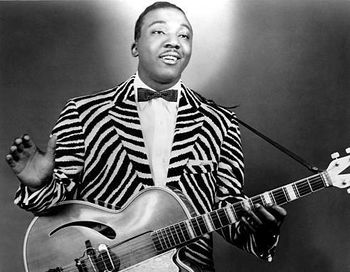Difference between revisions of "J.B. Lenoir"
(Clean-up.) |
|||
| (2 intermediate revisions by 2 users not shown) | |||
| Line 1: | Line 1: | ||
| + | __NOTOC__ | ||
| + | |||
[[File:J.B. Lenoir.jpg|350px|thumb|right|J.B. Lenoir.]] | [[File:J.B. Lenoir.jpg|350px|thumb|right|J.B. Lenoir.]] | ||
| − | '''J.B. Lenoir''' (March 5, 1929 – April 29, 1967) was an American blues singer and guitarist. He is best known for his songs ''Korea Blues'' (1951), ''Eisenhower Blues'' (1952) and ''Mamma, Talk To Your Daughter'' (1954). Lenoir's songs are notable for their outspoken commentary on racism, the Korean and the Vietnam War. He died in 1967 at age 38 from internal bleeding after a car crash. | + | '''J.B. Lenoir''' (March 5, 1929 – April 29, 1967) was an American blues singer, hamonica player and guitarist. He is best known for his songs ''Korea Blues'' (1951), ''Eisenhower Blues'' (1952) and ''Mamma, Talk To Your Daughter'' (1954). Lenoir's songs are notable for their outspoken commentary on racism, the Korean and the Vietnam War. He died in 1967 at age 38 from internal bleeding after a car crash. |
In 2011 he was inducted in the Blues Hall of Fame. | In 2011 he was inducted in the Blues Hall of Fame. | ||
| Line 9: | Line 11: | ||
During the [[KPPC, Pasadena]] radio show, when Zappa was guest DJ, he played four songs by Lenoir: ''"Mama, Talk To Your Daughter", "The Eisenhower Blues", "Mama, Your Daughter Is Gonna Miss Me"'' and ''"I'm In Korea"''. | During the [[KPPC, Pasadena]] radio show, when Zappa was guest DJ, he played four songs by Lenoir: ''"Mama, Talk To Your Daughter", "The Eisenhower Blues", "Mama, Your Daughter Is Gonna Miss Me"'' and ''"I'm In Korea"''. | ||
| − | Zappa about | + | Zappa about [[Trouble Every Day]]: |
| + | <blockquote>One of the things that it derives from is there has been a tradition in blues lyrics to tell social stories. A lot of people in the pop music world are unfamiliar with the world of folk music or the world of blues lyrics. I had grown up listening to blues records, so that kind of form wasn't unfamiliar [to me]. But the things that were being spoken about in the folk songs and the blues records were not generally major news stories. There was a guy named J.B. Lenoir who had a couple of songs, "The Eisenhower Blues" and "I Am In Korea." If you can ever find those records and listen to those things they were made in the early 50's. That would be some of the roots the Watts riots songs would come from. Maybe it was unique for a white person's rock and roll to stick something like that in it, but in other musical forms that kind of style had existed to a degree.<ref>[http://tomgraves.blogspot.com/2005/01/my-long-ass-interview-with-frank-zappa.html My Long-Ass Interview with Frank Zappa (1987)]</ref></blockquote> | ||
| − | + | ==Streams== | |
| + | [https://music.apple.com/album/eisenhower-blues/1079258366 Apple Music] | ||
| + | [https://open.spotify.com/album/5Ity8kBSGTyvGvzmKejMk5?si=40RtINikQDCqgm1llMkRsw&dl_branch=1 Spotify] | ||
==Sources== | ==Sources== | ||
<references/> | <references/> | ||
| Line 20: | Line 25: | ||
[[Category:Blues singers|Lenoir, J.B.]] | [[Category:Blues singers|Lenoir, J.B.]] | ||
| + | [[Category:Singers|Lenoir, J.B.]] | ||
| + | [[Category:Harmonica players|Lenoir, J.B.]] | ||
| + | [[Category:Guitarists|Lenoir, J.B.]] | ||
[[Category:Influences|Lenoir, J.B.]] | [[Category:Influences|Lenoir, J.B.]] | ||
[[Category:Favorite Artists|Lenoir, J.B.]] | [[Category:Favorite Artists|Lenoir, J.B.]] | ||
Latest revision as of 12:56, 3 December 2021
J.B. Lenoir (March 5, 1929 – April 29, 1967) was an American blues singer, hamonica player and guitarist. He is best known for his songs Korea Blues (1951), Eisenhower Blues (1952) and Mamma, Talk To Your Daughter (1954). Lenoir's songs are notable for their outspoken commentary on racism, the Korean and the Vietnam War. He died in 1967 at age 38 from internal bleeding after a car crash.
In 2011 he was inducted in the Blues Hall of Fame.
Zappa and Lenoir
During the KPPC, Pasadena radio show, when Zappa was guest DJ, he played four songs by Lenoir: "Mama, Talk To Your Daughter", "The Eisenhower Blues", "Mama, Your Daughter Is Gonna Miss Me" and "I'm In Korea".
Zappa about Trouble Every Day:
One of the things that it derives from is there has been a tradition in blues lyrics to tell social stories. A lot of people in the pop music world are unfamiliar with the world of folk music or the world of blues lyrics. I had grown up listening to blues records, so that kind of form wasn't unfamiliar [to me]. But the things that were being spoken about in the folk songs and the blues records were not generally major news stories. There was a guy named J.B. Lenoir who had a couple of songs, "The Eisenhower Blues" and "I Am In Korea." If you can ever find those records and listen to those things they were made in the early 50's. That would be some of the roots the Watts riots songs would come from. Maybe it was unique for a white person's rock and roll to stick something like that in it, but in other musical forms that kind of style had existed to a degree.[1]
